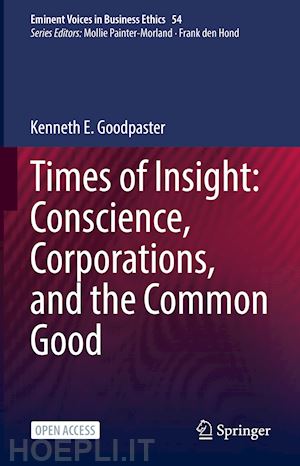
Questo prodotto usufruisce delle SPEDIZIONI GRATIS
selezionando l'opzione Corriere Veloce in fase di ordine.
Pagabile anche con Carta della cultura giovani e del merito, 18App Bonus Cultura e Carta del Docente
This open access book traces the research and teaching contributions of Kenneth Goodpaster over more than 45 years of his career. The book shows the content and the progression of these themes over the years identifying four insights in applied ethics: the moral insight, the institutional insight, the anthropological insight, and the Socratic insight. It highlights such concepts as conscience, corporate responsibility, corporations as agents and as recipients, stockholders, stakeholders, comprehensive moral thinking, and ethics education. In addition, Goodpaster explains phrases such as teleopathy, moral projection, human dignity, and the common good. Finally, the book examines with concern the implications of the foregoing for the polarizing and partisan trends in contemporary business behavior.
Kenneth Goodpaster’s new book, Times of Insight: Conscience, Corporations, and the Common Good reflects the culmination of 50 years of incredible philosophical insights forming the basis of business ethics. His concept of ‘corporate conscience’ as a moral projection from individual conscience to organizational behavior is both an original as well as a most worthwhile approach to organizational responsibility. Coupling that with a clear notion of the common good, Goodpaster provides substantive grounds for a creative analysis of ethical issues in business. This is one of the most exciting new books in the field.
- Patricia H. Werhane, Professor Emerita, University of Virginia and Professor Emerita, DePaul University.
"Beginners beware. “Wickedly interdisciplinary” describes corporate ethics. More than “interdisciplinary,” the field asks questions that range across disciplines, nations and centuries. Who better to cut this Gordian Knot than Ken Goodpaster, a true giant in the field, who mixes a prodigious knowledge of contemporary corporations with a deep understanding of intellectual history to produce a new and stunning amalgam. A must-read."
- Thomas Donaldson, The Mark O. Winkelman Professor, The Wharton School, University of Pennsylvania
As one of the pioneers in business ethics, Kenneth Goodpaster has given us a great gift of synthesizing 50 years of philosophical reflection and corporate practice on some of the most important questions and issues for business today. This work is not nostalgia, but an important source of wisdom for leaders today and into the future.
- Dr. Michael Naughton, Director, Center for Catholic Studies, Koch Chair in Catholic Studies, University of St. ThomasKenneth Goodpaster earned his A.B. in mathematics from the University of Notre Dame and his Ph.D. in philosophy from the University of Michigan. He taught philosophy at the University of Notre Dame during the 1970s before joining the Harvard Business School faculty in 1980.
In 1990, Goodpaster accepted the David and Barbara Koch Endowed Chair in Business Ethics at the University of St. Thomas (MN). At St. Thomas, he introduced a Great Books Seminar for graduate students in business, law, education, and engineering.
His book Conscience and Corporate Culture (Wiley-Blackwell, 2007) received generous praise from reviewers and he contributed to Vocation of the Business Leader, issued by the Vatican’s Pontifical Council for Justice and Peace (2012) and Respect in Action: Applying Subsidiarity in Business (UST Center for Catholic Studies, 2015).
Goodpaster served for a number of years as an Associate Editor of Business Ethics Quarterly and was Executive Editor of Corporate Responsibility: The American Experience (Cambridge University Press, 2012) which received the 2014Academy of Management Best Book Award.
In 2014, he was named to Ethisphere Magazine’s list of the 100 Most Influential People in Business Ethics—and was honored by the Society for Business Ethics for a “Career of Outstanding Scholarly Achievement in the Field of Business Ethics.” He is now Professor Emeritus in the St. Thomas Opus College of Business.
Goodpaster's wife Harriet is a nationally-recognized equestrian and a (retired) software engineer. They have three children, four grandchildren -- and a Morgan horse.











Il sito utilizza cookie ed altri strumenti di tracciamento che raccolgono informazioni dal dispositivo dell’utente. Oltre ai cookie tecnici ed analitici aggregati, strettamente necessari per il funzionamento di questo sito web, previo consenso dell’utente possono essere installati cookie di profilazione e marketing e cookie dei social media. Cliccando su “Accetto tutti i cookie” saranno attivate tutte le categorie di cookie. Per accettare solo deterninate categorie di cookie, cliccare invece su “Impostazioni cookie”. Chiudendo il banner o continuando a navigare saranno installati solo cookie tecnici. Per maggiori dettagli, consultare la Cookie Policy.